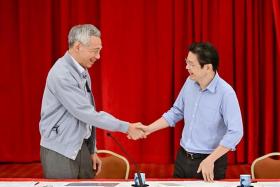Singapore will need to rethink its policies: President Halimah
President Halimah outlines how the Government will lead in time of upheaval
Singapore is at an inflection point and the country needs to understand the major changes taking place, both at home and abroad, as it rethinks its social models and policies to suit the new circumstances, President Halimah Yacob said yesterday.
This includes taking a fresh look at its crucial pillars of society, such as its concept of meritocracy, multiracialism, and the way Singapore conducts its politics, the President said at the opening of the 14th Parliament.
For the first time, the event took place at two locations - Parliament House and the Arts House - to ensure safe distancing due to Covid-19.
Sketching out the Government's plans and priorities for its new term in office, President Halimah noted this takes place under the shadow of Covid-19, which has sharpened global fault lines and disrupted the stable international order under which Singapore has long thrived.
The pandemic has fuelled a new wave of protectionism and this is "especially challenging for Singapore, as we make our living by doing business with the world", she said.
At home, new generations coming of age have their own aspirations, such as a desire for more diverse voices to be heard and stronger checks and balances. New leaders are also emerging to take the country forward, she noted, adding that they would have to forge bonds and a new compact with the people.
"For Singapore to continue to succeed, we need to understand these changes in our external and domestic environments, rethink our problems and improve on our status quo."
There is "great urgency to transform the economy and find new ways of making a living", including a push for sustainable growth and a greener future.
Securing jobs for Singaporeans will remain the top priority for the next few years, but it must ensure the benefits of progress are shared widely with all citizens, she said.
While meritocracy has served Singapore well for the past 55 years, the model has to evolve in tandem with the country's development, the same way social safety nets have been strengthened over the past decade.
As part of this shift in social policy, she said the Government will do more to support every Singaporean, at each stage of life. "More redistribution cannot be the only way to level up those who are doing less well. We also have to continue strengthening social mobility and broadening our conception of merit."
And while multiracialism has been a core element of Singaporean identity, it remains a work in progress. Younger Singaporeans want these issues discussed candidly, but it must be done with care, she added.
Singaporeans need to recognise there are larger forces at play that will test the nation's solidarity and pull people in different directions.
Urging against turning inward in the face of tough times, she said: "Our Singaporean identity has been formed and strengthened not by excluding those who arrive later, but by successive arrivals adding to the richness of our society."
On politics, the designation of a Leader of the Opposition reflects the larger number of opposition MPs in Parliament, and that both the Government and the opposition have roles to play to build trust in Singapore's public institutions and achieve good outcomes for the country, said the President.
The Government will be open to constructive criticism, rational debate and a new way of doing things, while the opposition should propose policy alternatives to be scrutinised and debated besides raising questions and criticisms.
"The key question is how to forge a common cause together, regardless of our own political inclinations. We need to base our rhetoric on a responsible sense of the realities, and come to a shared understanding about our goals and constraints."
For its part, the Government will evolve its policies, recognising that no solutions are right for all time, and will listen to new ideas objectively. But where staying the course remains the best way forward, it will have to convince Singaporeans to persevere.
The Government must not shy away from taking tough decisions in the national interest, or shirk the duty of winning support for such decisions, she added. "In all cases, we will seek to do what is best for Singapore and Singaporeans."
Get The New Paper on your phone with the free TNP app. Download from the Apple App Store or Google Play Store now



